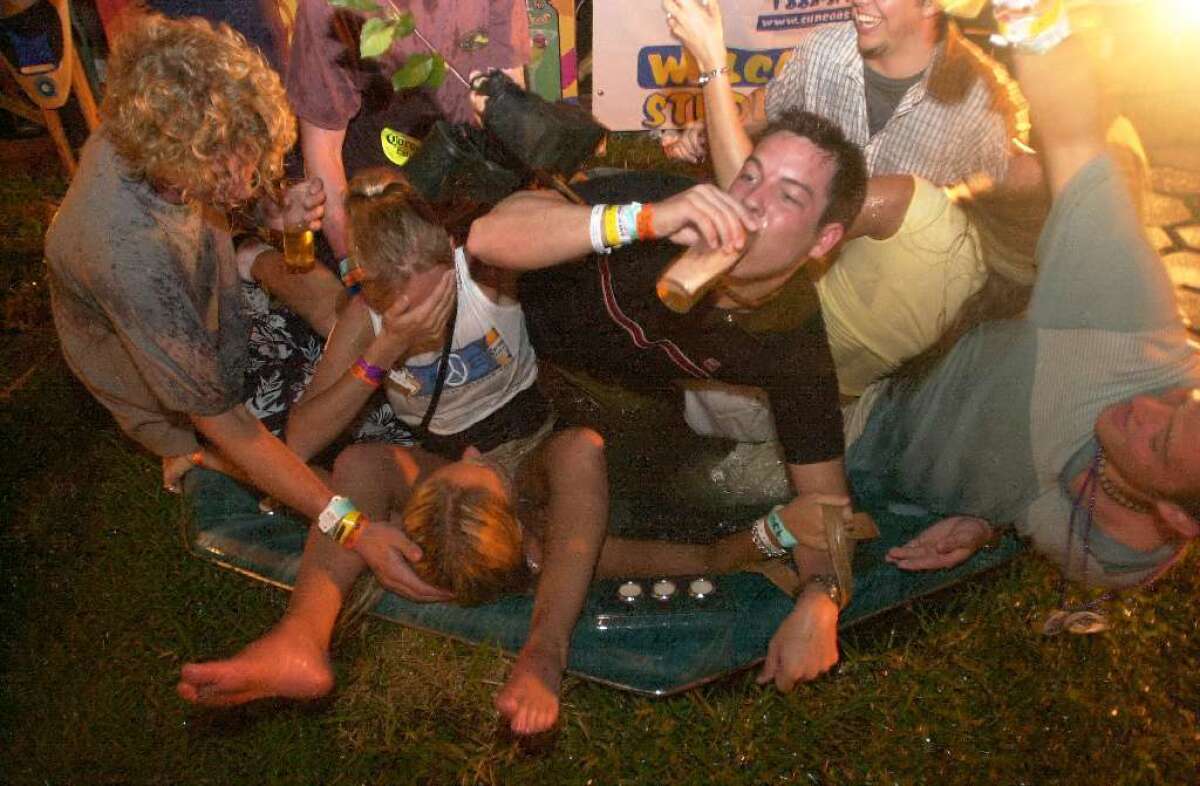9 out of 10 problem drinkers in the U.S. aren’t alcoholics, study says

- Share via
You might think that people who throw back five or more drinks in a single outing or who down 15 or more drinks in a week are likely to be alcoholics. But a new study finds that the overwhelming majority of them are not.
Only one out of 10 Americans who drank enough to qualify as a binge drinker or an excessive drinker met the clinical definition for alcohol dependence, according to a report released this week by the U.S. Centers for Disease Control and Prevention.
That may be good news, the report authors say, because it means policy makers can fight back against these dangerous drinking behaviors without having to send legions of people to addiction treatment.
Excessive drinking in the U.S. leads to roughly 50,000 deaths each year because of alcohol-related car crashes, falls, homicides and other acute causes. It also kills about 38,000 people each year as a result of chronic diseases like alcoholic liver disease, cirrhosis and hypertension, according to the CDC. Binge drinking accounts for about half of these deaths.
Although “it is often assumed that most excessive drinkers are alcohol dependent,” no studies have been done in recent years to prove that this assumption is correct, according to the report. So a team from the CDC, the federal Substance Abuse and Mental Health Services Administration and Boston University Medical Center set out to fill this gap.
They examined data on nearly 140,000 American adults who took part in the National Survey on Drug Use and Health between 2009 and 2011. At least some of the survey-takers were probably less-than-honest about their drinking habits; if so, that would tend to understate the true level of problem drinking, the researchers noted.
In the study, binge drinking was defined as consuming five or more drinks in a single occasion for men and four or more for women. Excessive drinking included binge drinking and heavy drinking (15 or more drinks per week for men and eight or more drinks per week for women), along with any drinking by pregnant women or adults below the legal drinking age of 21.
Subjects were considered to be alcohol dependent if they met at least three of the seven criteria laid out in the Diagnostic and Statistical Manual of Mental Disorders, Version IV (tolerance for alcohol; withdrawal symptoms; impaired control; inability to cut back or stop drinking altogether; continued drinking despite the problems it creates; neglecting one’s obligations; and spending too much time drinking.)
The results: More than 7 in 10 Americans drank on at least on occasion in the past year. Problem drinking was also common: Nearly 3 in 10 drank excessively (29.3%) or binge-drank (27.4%) at least once in the month before they were surveyed. Compared to Americans in general, binge drinkers were more likely to be men, white, between the ages of 18 and 24, have spent some time in college and be in a family that earns at least $75,000 per year.
Among those who had engaged in excessive drinking, 10.2% were alcohol dependent. And among those who had engaged in binge drinking, 10.5% were alcohol dependent. “Even among those who reported binge drinking 10 or more times in the past month, more than two-thirds did not meet diagnostic criteria for alcohol dependence,” the authors reported.
That means there’s no need to drastically ramp up referrals for alcohol addiction treatment. Instead, public health officials seeking to reduce the ill effects of problem drinking can turn to tried-and-true policies that have been demonstrated to work in some states, the study authors wrote. These include higher alcohol taxes, making sure that businesses selling alcohol aren’t packed too close together, and using liability laws to make bars, taverns and other establishments that serve alcohol legally responsible for the actions of their intoxicated patrons.
If science gives you a buzz, follow me on Twitter @LATkarenkaplan and “like” Los Angeles Times Science & Health on Facebook.






